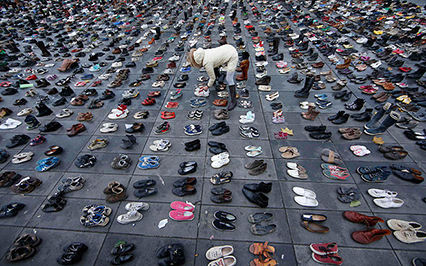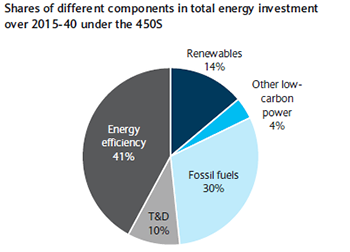
Ambrose Evans-Pritchard
PARIS (The Telegraph/Pacific Media Watch): A far-reaching deal on climate change in Paris over coming days promises to unleash a $30 trillion blitz of investment on new technology and renewable energy by 2040, creating vast riches for those in the vanguard and potentially lifting the global economy out of its slow-growth trap.
Economists at Barclays estimate that greenhouse gas pledges made by the US, the EU, China, India, and others for the COP-21 climate summit amount to an epic change in the allocation of capital and resources, with financial winners and losers to match.
They said the fossil fuel industry of coal, gas, and oil could forfeit $34 trillion in revenues over the next quarter century – a quarter of their income – if the Paris accord is followed by a series of tougher reviews every five years to force down the trajectory of CO2 emissions, as proposed by the United Nations and French officials hosting the talks.
 By then crude consumption would fall to 72m barrels a day - half OPEC projections - and demand would be in precipitous decline. Most fossil companies would face run-off unless they could reinvent themselves as 21st Century post-carbon leaders, as Shell, Total, and Statoil are already doing.
By then crude consumption would fall to 72m barrels a day - half OPEC projections - and demand would be in precipitous decline. Most fossil companies would face run-off unless they could reinvent themselves as 21st Century post-carbon leaders, as Shell, Total, and Statoil are already doing.
The agreed UN goal is to cap the rise in global temperatures to 2 degrees centigrade above pre-industrial levels by 2100, deemed the safe limit if we are to pass on a world that is more or less recognisable.
Climate negotiators say there will have to be drastic "decarbonisation" to bring this in sight, with negative net emissions by 2070 or soon after. This means that CO2 will have to be plucked from the air and buried, or absorbed by reforestation.
Such a scenario would imply the near extinction of the coal industry unless there is a big push for carbon capture and storage. It also implies a near total switch to electric cars, rendering the internal combustion engine obsolete.
'Soft landing'
The Bank of England and the G20's Financial Stability Board aim to bring about a "soft landing" that protects investors and gives the fossil industry time to adapt by forcing it to confront the issue head on.
Barclays said $21.5 trillion of investment in energy efficiency will be needed by 2040 under the current pledges, which cover 155 countries and 94pc of the global economy. It expects a further $8.5 trillion of spending on solar, wind, hydro, energy storage, and nuclear power.
Those best-placed to profit in Europe are: Denmark's wind group Vestas; Schneider and ABB for motors and transmission; Legrand for low voltage equipment; Alstom and Siemens for rail efficiency; Philips, and Osram for LEDs and lighting.
But this is a minimalist scenario. While the Paris commitments suggest a watershed moment, they do not go far enough to meet the targets set by the Intergovernmental Panel on Climate Change (IPPC). The planet has already used up two-thirds of the allowable "carbon budget" of 2,900 gigatonnes (GT), and will have used up three quarters of the remaining 1,000 GT by 2030.
Barclays advised clients to prepare for a more radical outcome, entailing almost $45 trillion of spending on different forms of decarbonisation.
"The fact that COP-21 in itself is clearly not going to put the world on a 2 degree track does not mean that fossil-fuel companies can simply carry on with business-as-usual. We think they should be stress-testing their business models against a significant tightening of global climate policy over the next two decades," it said.
The main enforcement tool would be a rise in carbon prices to an estimated $140 a tonne by 2040 - either in the form of a tax or an emissions trading scheme. The pincer coming from the other side would an assault on direct fossil fuel subsidies, estimated at $550bn a year by the International Energy Agency.
'Massive opportunity'
Michael Jacobs from the Global Commission on Energy and Climate said the Paris accord is an instrument of economic signalling. "It is telling markets and investors that there is a massive opportunity before them," he said.
It is not yet certain that there will be a binding agreement. There could still be a dispute over the promised $100bn a year of mitigation funding for developing countries, though this issue is more symbolic than real when set against the trillions at stake. "It's peanuts," said Christiana Figueres, the UN's climate chief.
The mood in Paris is radically different from the Copenhagen summit in 2009, poisoned by a 'North-South' split over who is responsible, and who should pay to clean up the greenhouse legacy.
"What has really changed everything is that the cost of renewables has come down so far: what looked impossible six years ago in Copenhagen is now possible," said Mark Lewis, the chief author of the Barclays report. Renewables made up half of all new power added worldwide last year.
"The average cost of global solar was $400 a megawatt/hour worldwide in 2010. It fell to $130 in 2014, and now it has fallen below $60 in the best locations. Almost nobody could have imagined this six years ago," he said.
Lewis said the next big breakthrough - perhaps within five years - will be in cheap energy storage, conquering the curse of intermittency and accelerating an unstoppable snowball effect driven by market forces. The IEA expects solar and wind capacity to rise eightfold under a 2 degree trajectory.
The historic inflexion point was a deal by US President Barack Obama and China's Xi Jinping last year to push for radical curbs, entirely changing the character of global climate politics. "The two 800-pound gorillas are working together," says Todd Stern, the chief US climate negotiator.
Switched sides
China has in effect switched sides since Copenhagen, no small matter for a country that now emits as much CO2 as the US and the EU combined. It has embraced green energy with the zeal of the converted, rushing to clean up its toxic cities and head off a middle-class revolt that threatens the legitimacy of the Communist regime.
It will introduce a cap-and-trade system for emissions in 2017. The dirtiest coal plants are being shut down. Some 200 GW of solar capacity are to be installed by the end of the decade. President Xi Jinping has vowed to cap total CO2 emissions by 2030 - if not earlier.
Jacobs said a deal in Paris is highly likely. "You can never rule out a break-down. These meetings always go to the wire. But we have gone past the turning point in the US and China, and both countries have come to the realisation that it is possible to decarbonise without hurting economic growth," he said.
It will not be a legally-binding treaty, but it is expected to have the same effect as each country transposes the targets into its own law. In the US it will be enforced through the legal mechanism of the Clean Air Act, anchored on earlier accords, without need for Senate ratification.
The sums of money are colossal. Macro-economists say this is just what is needed to soak up the global savings glut and rescue the world from its 1930s liquidity trap. There might even be a boom.
This work is licensed under a Creative Commons Attribution-NonCommercial 3.0 New Zealand Licence.




